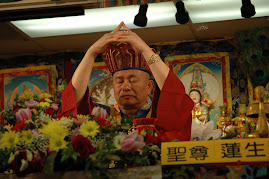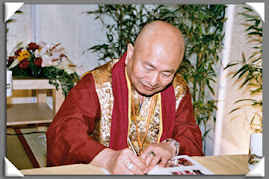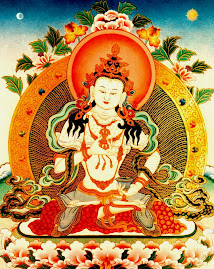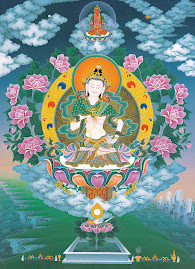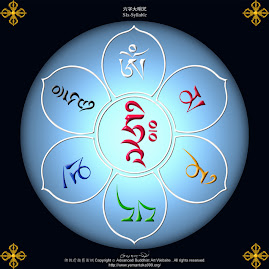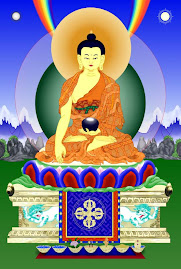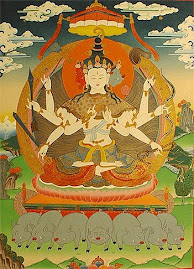By Grand Master Sheng-Yen Lu
The precepts in the Bodhisattva Vows are very strict and not easy to observe. However, all Buddhists should observe the Five Precepts. The Five Precepts and the precepts for Sramanera [ordained novice Buddhist practitioners], together with the Bodhisattva Vows, constitute the "Triple Ordination Vows." The Bodhisattva Vows are precepts of a very high order. If one can observe the Bodhisattva Vows, it will be very easy for one to become a Bodhisattva in the future. While it is easy to initially take these vows, observing them continuously is very difficult. As it is hard to observe these vows, what should one do if one breaks them? One has to repent. The Bodhisattvas are very compassionate and they will forgive one if there is genuine repentance. However, one should not take advantage of their compassion and repeatedly break one's vows. One should not treat these vows lightly, thinking that the Bodhisattvas will forgive one anyway. It is true that the Bodhisattvas are very compassionate and will forgive, but one must also be very careful. Pay special attention to these vows and do not break them easily or lightly. If one were to break these vows every day, then have to do repentance every day, one will not only embarrass oneself, the Bodhisattvas will grow tired of listening to these daily confessions. It is easy to take the Bodhisattva Vows but hard to keep them. Under any circumstances, when one makes a mistake, one must repent. One has to recite the Bodhisattva Vows between three and twenty-one times before the Bodhisattvas and state which vow one has broken. The Bodhisattva Vows can be taken by any disciple. In the Certificate of the Taking of Bodhisattva Vows, it is clearly stated: "I vow to observe the precepts of the Bodhisattva Vows with my utmost effort throughout my lifetime." Every one has to try one's hardest, and act accordingly within this physical life, to abide by the Bodhisattva Vows and to not break any of them. Buddha Shakyamuni and Maitreya Bodhisattva have instructed the Holy Red Crown Vajra Master, Living Buddha Lian-shen, to guarantee to all that, if one can abide by the vows, one can be reborn in the Maha Twin Lotus Ponds and radiate Light both in mind and in body. By observing the vows, one is guarding the Pearl of Light in one's heart. The heart will become purified when Light radiates naturally from this
(The following are the Five Precepts, the Bodhisattva Vows for household practitioners, as well as explanations given by Living Buddha Lian-shen on some of the precepts.)
The Five Precepts
1. Refrain from killing. The retribution for killing is very heavy. One must not kill. Even more, one should release captive animals. However, many disciples are in the restaurant business. If they are not to kill, what should they do? They can first recite the Rebirth Mantra, then visualize all the animals ascend [to the
2. Refrain from taking intoxicants. Since alcohol can intoxicate one's mind, one should not drink. However, may one take a moderate amount of alcohol? Sometimes medicines are prepared in elixirs which contain alcohol; can one take these? Yes, these are permitted. This precept really refers to no intoxication from alcohol. When drunk, one loses one's control of one's mind. In addition, the body will be injured by the toxins from alcohol and will generate a bad odor. When the body is unclean, there will not be any fragrant smell.
3. Refrain from engaging in "double talk" or gossip. One should not criticize, slander, use ill speech, or flirtatious words. Refraining from double talk means do not gossip. In addition, I find that modern men sometimes have halitosis due to poor digestion, cavities, gum disease, and the fermentation of food particles in their mouths. There are two methods to take care of halitosis: takes good care of one's teeth and gums, and keep good oral hygiene; do not "bad mouth" others. When one takes good care of one's digestive tract, one's breath will be as fresh and as fragrant as the orchids.
4. Refrain from committing adultery. Any sexual conduct with anyone other than one's spouse is improper. One may engage in a sexual relationship with one's spouse, as one can lead a normal home life in the
5. Refrain from stealing. It is best if everyone can keep this precept. A Buddhist should, besides keeping this precept, also persuade others not to steal or rob, so the whole community or society can maintain peace and harmony. If stealing and robbing exist in a society, no one will be exempt from this worrisome thought: When will it be my turn to be robbed? As for me, do not think that this bag which I carry wherever I go has in it any cash, American dollars, or diamonds. All I have inside is my return ticket to the
The Bodhisattva Vows for household practitioners:
The Six Greater Vows 1. Vow not to kill. 2. Vow not to steal. 3. Vow not to lie. One should not lie about one's spiritual achievement. One should not declare that one has achieved Enlightenment or the Fruition of Bodhisattvahood when one has not done so. 4. Vow not to commit adultery. 5. Vow not to buy liquor. "Not to buy liquor" also means not buying liquor for others. For example, if an official in Mainland China tells one, "This matter needs some studying!'' then one has to give him presents,
(The pronunciation of "studying" in Mandarin Chinese is similar to that of "cigarettes" and "liquor.") such as cigarettes and liquor. However, if one gives him liquor as a gift, one will be breaking this vow. If one does not do this oneself, but asks someone to do it in one's place, one is still breaking this vow by complicity in its breakage. [audience laughter] 6. vow not to criticize members of the Four Buddhist Groups2
The Twenty-Eight Lesser Vows
1. Vow to make offerings to one's parents and teachers.
2. Vow not to indulge in pleasures and alcoholic intoxication.
3. Vow to look after people in their sicknesses. lllnesses are very painful. If one's relatives or fellow Dharma friends are ill, one should visit them and help them. The most meritorious act in the Field of Blessing is to take care of people who are ill. Therefore, when fellow Dharma friends are ill, we should visit them and help them ease their stresses.
4. Vow to give alms to beggars.
5. Vow to receive and pay respect to the elders and members of the Four Buddhist groups.
6. Vow to refrain from pride and complacency when witnessing other practitioners breaking the vows.
7. Vow to keep the vegetarian diet each month on the Six Vegetarian Days. This is quite difficult to keep. However, if one can keep all one's breakfasts vegetarian, then one can consider it a substitute for this vow. [audience laughter and applause] [Editor's note: the Six Vegetarian Days traditionally are the 8th, 14th, with, 23rd, 29th, and 30th of each lunar month. In some months, the last two days are 28th and 29th.]
8. Vow to attend teachings on Buddhism. If there are teachings to be given by a Buddhist master, one should attend. Even if one is not sure if that particular teaching is relevant to one's practice, or if that teaching is even contradictory to what we practice, one should still attend if one knows that Buddhist master very well. If the lecturer is a master of our school, one must attend. If it is a master from a different school, one may attend if one is interested in the topic.
9. Vow not to use the possessions of a monk or nun. If a monk or nun gives one permission to use his or her personal belongings, then one may do so. However, if one uses such possessions without asking, then one is breaking the vow. For example, a bed that a monk or nun sleeps on all the time is their possession and one cannot just go and lay down on that bed.
10. Vow not to drink water with insects or worms in it. This was, in the past, a difficult vow to keep because water from wells often contained many insects and worms. Today water from our faucets is free of insects and worms. [audience laughter]
11. Vow not to walk alone in dangerous places.
12. Vow not to stay alone in a nunnery.
13. Vow not to physically abuse others because of monetary matters.
14. Vow not to give leftover food to members of the Four Buddhist Groups.
15. Vow not to keep cats as domestic animals. The Bodhisattvas treat self and others equally-one is the equal of all animals. Therefore, one cannot feed cats and dogs with leftover food. One must feed them with clean food; otherwise, one is abusing them. This can be very difficult to avoid, so it is easier to just not keep any animals at all. Also, in order to keep a shrine clean, one should not keep animals such as cats and dogs because they can dirty up the place.
(2 Monks, nuns, novice monks and novice nuns.)
16. Vow to feed domestic animals with clean food. This is similar to the preceding vow.
17. Vow to offer robes, bowl, and staff to acquaintances who enter the monkhood. If one has a relative or friend who has decided to take the renunciation vow to become a monk, one should prepare the Three Robes, the bowl, and the staff to offer to him. One must make such offerings to someone who is going to enter the monkhood.
18. Vow to keep irrigation systems clean. If one is a farmer, one cannot use water that belongs to others. One must keep the irrigation system moving and clean, so it will not become a breeding ground for mosquitoes, flies, or the accumulation of refuse.
19. Vow to be fair in business dealings.
20. Vow not to engage in sexual activity at improper times and places. As a household practitioner, if one engages in sexual activity with one's spouse, one must do it in bed and in the night time. One should not do it under a tree or in other improper places. "Improper time" means day time. One must do it at night.
21. Vow not to cheat on any taxes.
22. Vow not to break the laws of one's country.
23. Vow to offer any fresh food first to the Triple Jewels. If one has any new or fresh food, one must first offer it to the Triple Jewels. The Triple Jewels are the Buddha, Dharma, and Sangha [spiritual community]. It is not very nice if one remembers only after one has half-eaten the food, because then the food is already contaminated with one's saliva. [audience laughter] Each time before one eats, one should visualize the offering, multiply it and recite the Mandala Offering Mantra. This is one of the lesser vows. One cannot offer any food one has begun eating or offer any leftover food. If one has kept the food in the refrigerator and has not eaten any of it, then it is considered fresh food.
24. Vow not to give one's own teaching while a monk is preaching. This means when a monk teaches, one should not give a teaching during this time. Instead, one should go and listen to the monk.
25. Vow to walk in the correct order when accompanying the members of Five Buddhist Groups. The members of Four Buddhist Groups refer to monks and nuns (fully ordained men and women who accept the complete rules or precepts), and novice monks and novice nuns (men and women who have left the home life and accepted the Ten Precepts). The Five Buddhist Groups consist of the four above mentioned groups, plus the female neophytes (who accept the Six Precepts). Another explanation of the Five Groups refers to monks, nuns, novice monks, novice nuns, and masters/elders. When one encounters the members of Five Groups, one has to slow down one's pace and walk behind them. If, however, one is leading or guiding them up to the altar, one will have to walk in front of them.
26. Vow to divide offerings equally among all monks.
27. Vow not to raise silk worms. The purpose of raising silk worms is to let them spin the silk which is harvested for making cloth. Afterward the silk worms die. We do not practice this anymore.
28. Vow to not abandon sick people on the roadside. Sometimes one encounters the following situation: someone is lying ill on the roadside. One too often takes a look and says, "Oh! I don't have time!" It is not right if one sees someone ill and runs away without lending a helping hand. If one sees a severely ill person on the roadside, it is also wrong to pretend one does not see that person-even if one is afraid of trouble.











